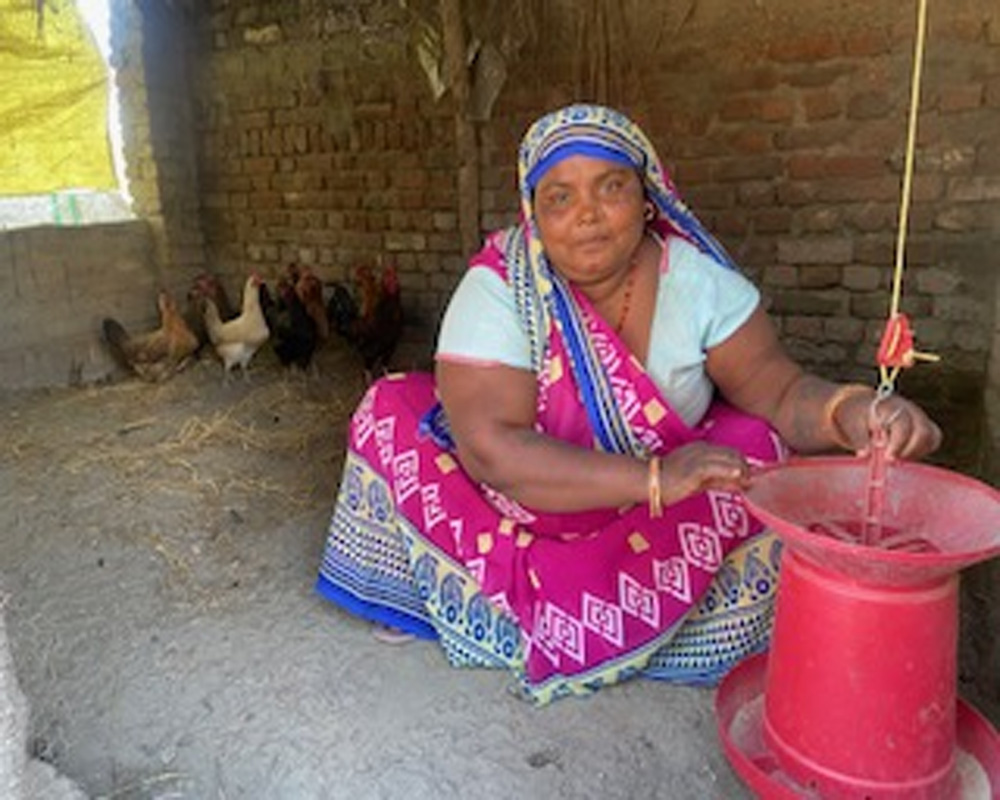Four-month-old Angel Singh defied expectations. Born post-term after a ten-month pregnancy, some feared she would be weak and sickly. But her mother, Pinky, was confident that her child would be healthy. Her belief was rooted in her commitment to antenatal checkups and a nutritious diet, including antibiotic-free poultry and eggs from her own backyard farm.
Living in Samsa Tarhar village in Uttar Pradesh’s Bahraich district—one of India’s most backward regions—Pinky leveraged her poultry farming knowledge to maintain a healthy diet. By raising chickens with natural feed and herbal remedies instead of antibiotics, she reduced the risk of developing antimicrobial resistance (AMR), a condition linked to the consumption of meat and eggs from poultry fed antibiotics to promote rapid growth and prevent diseases.
The importance of this practice is underscored by alarming statistics. In 2019, over 297,000 deaths in India were directly attributed to AMR. A study by the Centre for Science and Environment found widespread antibiotic use in poultry farms in Uttar Pradesh, highlighting the poultry sector as a reservoir for multi-drug-resistant bacteria. The World Health Organization (WHO) acknowledges that non-therapeutic antibiotic use in food-producing animals contributes to AMR in humans.
Pinky’s awareness of these risks grew after she joined the backyard poultry (BYP) farming initiative by the Aga Khan Foundation (AKF). Implemented under their aspirational district program, the initiative aims to empower women, enhance food security, and improve incomes. Through training in poultry farming techniques, biosecurity, and herbal remedies for disease management, Pinky—then in her second trimester—realized poultry farming was not just about economic gain but also about taking control of her and her child’s health.
She is not alone. Sixty women from marginalized communities across 120 villages in four blocks of Bahraich have adopted sustainable and ethical poultry farming practices through AKF’s support. Each received 50 pre-vaccinated 21-day-old Sonali breed chicks, along with assistance for feeding and constructing chicken coops.
AKF’s strategy involved hands-on demonstrations and training on using medicinal plants and herbs as antibiotic alternatives. The simple yet effective ethnoveterinary methods made it easier for mostly uneducated women to adopt natural poultry farming practices.
“I used to give antibiotics to keep my poultry healthy, yet many still died,” recalls Rambha Devi from Samroha village. “After joining the program, I used turmeric water mixed with jaggery as a health tonic, chirata for deworming, and azolla, a protein-rich fern, to boost immunity. None of my chickens fell ill.”
According to Raghvendra Singh, AKF district coordinator for skill development, the chick mortality rate among AKF-supported farmers has dropped from the usual 10% to just 4.5%, thanks to natural feed and herbal remedies. Consequently, 90% of their chickens are sold, with the rest consumed at home, leading to improved family health, especially among children.
AKF evaluations show that each poultry farmer earns between Rs 10,000-14,000 in profit. Encouraged by this success, many women are reinvesting in poultry, even taking loans from self-help groups to purchase additional chicks now that they are no longer provided for free.
Pinky, for instance, is expanding her farm by purchasing 100 chicks. “The benefits of poultry farming are not just financial—it has transformed my life,” she says.
By embracing natural poultry farming, these women are not only securing their livelihoods but also protecting their families from the hidden dangers of antibiotic-laden poultry, paving the way for a healthier future.
Download Eggora Poultry App: https://www.eggora.com/download-app
